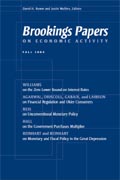In week 10 of Donald Trump’s presidency, following failure by the House of Representatives to pass its version of a bill to repeal and replace the Affordable Care Act, the president signed executive orders on energy and climate policy; signed a bill rolling back privacy regulations for internet service providers; and faced new revelations in the ongoing inquiry about Russian involvement in the U.S. presidential election.
Here’s an update on what Brookings experts are saying in the first 100 days about the Trump administration’s policy choices, personnel decisions, and engagements with global and domestic events. To receive daily updates on new Brookings research, commentary, and events, subscribe to our newsletters.
Read what Brookings experts had to say about the First 100 Days in: Week Nine | Week Eight | Week Seven | Week Six | Week Five | Week Four | Week Three | Week Two | Week One.
ON FOREIGN & NATIONAL SECURITY POLICY
Martin Indyk testified to the Senate Foreign Relations Committee on six elements of a strategy to push back on Iran’s hegemonic ambitions. “Countering Iran’s regional hegemonic ambitions is a deadly serious business,” Indyk said.
Jonathan Pollack says that when Chinese President Xi Jinping meets President Trump next week, North Korea will be “very high on the agenda.” Pollack argues that “Without a shared strategy at the highest levels of national leadership [in Washington and Beijing], the dangers posed by North Korean weapons development and the prospect of an acute crisis will only grow. “
Dany Bahar and Vanda Felbab-Brown, in a new episode of the Intersections podcast, discuss how U.S.-Mexico relations have been affected by the Trump administration, misconceptions about NAFTA, immigration, and crime, and why taking an “America first” approach won’t help U.S. consumers.
ON DOMESTIC & ECONOMIC POLICY
Adie Tomer says that although President Trump has talked about pursuing a massive infrastructure bill, talk about a single “infrastructure bill” doesn’t align with the way government is set up to handle it. Tomer says that Americans should not expect to see such a bill anytime in the near future. Watch:
Education Secretary Betsy DeVos, speaking at the release of the Center on Children and Families’ fifth annual Education Choice and Competition Index, said that “Parents know what is best for their kids and no parent should be denied the opportunity to send their son or daughter to a school where they feel confident he or she is going to learn in a safe and learning and growing environment.”
Elaine Kamarck discusses President Trump’s decision to put Jared Kushner in charge of the new Office of American Innovation and its impact on improving government operations.
Phil Wallach, discusses some of the lessons learned from President Trump’s executive order to eliminate the Clean Power Plan, including that “the Obama administration sought to build out an effective policy platform for a moderately ambitious climate program on a very unsteady legal foundation, given their inability to get a more reliable one through Congress.”
Nate Hultman looks at the implications for former President Obama’s climate agenda after President Trump’s executive orders on domestic energy policy, including dismantling the Clean Power Plan.
Dany Bahar examines President Trump’s two executive orders mandating a review of all U.S. trade agreements.
Joshua Meltzer discusses the trade agreements generally and the Trans-Pacific Partnership and NAFTA specifically. He says that “the idea that simply closing off imports to the U.S. economy would be good for growth makes no sense.” Watch:
Bill Gale says that Republicans will struggle to “win” on tax reform, and that they “will likely have to define a ‘win’ as a revenue-losing tax cut.”
Henry Aaron says that “the Affordable Care Act is mostly working quite well,” and that the GOP plan would have made the problems of Obamacare worse. “Trump and Republicans,” Aaron argues, “should devote themselves to correcting acknowledged flaws in Obamacare, not to sabotaging it.”
Stuart Brotman advises that while tariffs will be in the spotlight on any NAFTA re-negotiations, the Trump administration should “expand the scope of the telecommunications provisions by removing related trade barriers that have emerged.”
Molly Reynolds and Elizabeth Mann discuss whether in the wake of the failure of the GOP health care bill, the Trump administration and states will seek Section 1332 waivers to pursue health care reform plans. Such waivers, Reynolds and Mann write, “may help them address one of the challenges governors face in the current health care debate: the political interests of Republicans at the state level are not necessarily the same as those of their federal colleagues.”
Robert Gordon and Ron Haskins comment on Trump budget director Mick Mulvaney’s statements about cutting programs that he said don’t show any results. “[B]y invoking ‘evidence’ in selective attacks on two among dozens of programs his budget would eviscerate,” they write, “Mulvaney misses what matters most about how policymaking works – not just evidence-based policymaking, but policy leadership in general.”
—
For more details policy recommendations and analyses from Brookings experts for the new administration, see “Brookings Big Ideas for America” on issues including the threatened middle-class dream in America, health care, criminal justice reform, infrastructure, U.S. alliances, nuclear weapons, terrorism, and regional conflicts.




Commentary
President Trump’s First 100 Days: What Brookings experts are saying, 3/31/17
March 31, 2017